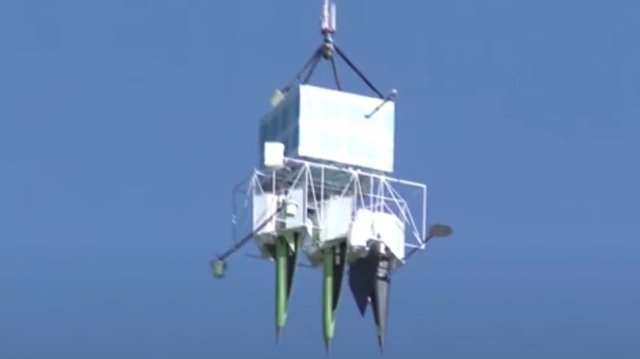Made in CHINA: CCP intensifies humanoid robot production to retain manufacturing dominance
01/05/2024 / By Belle Carter

China recently announced a grand plan to mass-produce humanoid robots that can perform various tasks and interact with humans to insulate itself from reliance on foreign powers and replace Chinese workers with machines.
China’s Ministry of Industry and Information Technology (MIIT) published a blueprint document back in November, saying that the robots would be as “disruptive” as smartphones and would “reshape the world.” According to the paper, the strategy aims to make the Chinese Communist Party (CCP) the global leader in the field of robotics by building a “humanoid robot innovation system,” developing artificial brains and limbs by 2025.
Being the world’s largest electronics manufacturer, CCP aims to achieve breakthroughs in environment sensing, motion control and machine-to-human interaction capabilities in the next two years, which is why it is striving to compete with the United States in the field of chips and hardware. In recent years, billionaire Elon Musk’s Tesla and Boston Dynamics have been leading the said industry.
The document also said that by using a whole-of-nation system, the communist regime could harness technologies to “profoundly change human production and lifestyle and reshape the global industrial development pattern.” However, according to several reports, this move carries national security implications and will help the CCP maintain an economic advantage, even though its population is nosediving due to years of severe restrictions on childbirth. In 2022, after six consecutive years of declining birth rates, China recorded its first annual population decline since the early 1960s. According to a forecast by the United Nations, the East Asian country’s population is set to fall from 1.42 billion in 2022 to 1.31 billion in 2050 and drop below 800 million by 2100. (Related: China’s humanoid robot factories to go online in 2025, HALF of human labor force to be eliminated.)
And so, China’s government is effectively replacing people with robots to maintain a competitive edge in labor-intensive manufacturing industries as per a report by the Center for Strategic and International Studies. In fact, a draft proposal by the regime’s internet regulator suggested back in April that all content generated by artificial intelligence (AI) should be mandated to “reflect the socialist core values” espoused by the CCP. According to the new document, all new robots and AI-powered artificial brains should be “guided by People’s Republic of China President Xi Jinping’s Thought on Socialism with Chinese Characteristics for a New Era.”
Director of the China Policy Initiative at the America First Policy Institute Adam Savit confirmed with the Epoch Times that the regime could use robots to spread communist ideology throughout the global marketplace. “They will certainly try,” he said. “The CCP takes advantage of any means available, especially innovative new technologies, to spread its ideology and expand its influence.” He also pointed to social media giant TikTok, which is owned by the CCP-affiliated ByteDance, as “the most successful and disturbing example” of Beijing’s s use of technology to spread its idealisms.
END GAME: CCP robots to dominate the world
According to reports, China installed 290,000 non-humanoid industrial robots in 2022, whereas the United States, by comparison, only installed 39,000. The former is now dominating in terms of robot density, as it has deployed more robots relative to workers. The communist nation now operates the largest operational stock of robots in the world.
This is something to worry about as the nation already can use automation to gain economic advantage in the years to come, a report by the International Federation of Robotics pointed out. “Robot density is a key indicator of automation adoption in the manufacturing industry around the world,” International Federation of Robotics President Marina Bill said. “China’s rapid growth shows the power of its investment so far, but it still has much opportunity to automate.”
Moreover, the International Institute for Strategic Studies (IISS) reported that the CCP seeks to earn a long-term advantage by establishing and controlling the supply chains required to create advanced robotics. “Beijing aims both to achieve a high degree of self-sufficiency and to capture a significant share of the global market for a wide array of advanced products and components,” the paper suggested. The report further noted that if the nation can gain an edge in what has been described as a fourth industrial revolution in manufacturing while reducing its dependence on high-tech imports, China may be able to boost its own prospects for long-term growth while diminishing those of its competitors.
“The really scary thing is,” Arthur Herman, a senior fellow at the Hudson Institute said, “is that it could lead to the CCP gaining more influence in establishing international standards and rules over AI and robotics. China’s robotics industry becomes the global standard, pushing aside any competition, including setting the moral standard.” The expert said that is not a good sign if people want to have sensible and responsible standards for the future development of a potentially disruptive technology that everyone can live with.
Head over to CommunistChina.news to read stories related to this.
Sources for this article include:
Submit a correction >>
Tagged Under:
AI, artificial intelligence, big government, CCP, China, Chinese Communist Party, communism, conspiracy, cyber war, Fourth Industrial Revolution, future science, future tech, glitch, humanoid, information technology, innovations, inventions, IT, national security, robotics, robots, TikTok, tyranny, Xi Jinping
This article may contain statements that reflect the opinion of the author
RECENT NEWS & ARTICLES
COPYRIGHT © 2020 CommunistChina.News
All content posted on this site is protected under Free Speech. CommunistChina.News is not responsible for content written by contributing authors. The information on this site is provided for educational and entertainment purposes only. It is not intended as a substitute for professional advice of any kind. CommunistChina.News assumes no responsibility for the use or misuse of this material. All trademarks, registered trademarks and service marks mentioned on this site are the property of their respective owners.



















